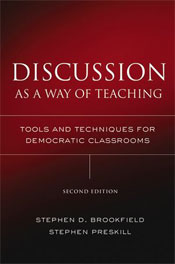Filed Under > TC Community
Can We Talk?
In a classroom, that depends on the art of the teacher. Adult education expert Stephen Brookfield tackles the challenges for onsite and online learners in a 2-day workshop offered by CEO&I.
Anyone who has ever stood at the head of a classroom knows the dreaded silence that can descend – even among a group of adults -- when the floor is opened for comment. The challenge is even more daunting when the “classroom” extends into cyberspace, with students tuning in from home computers around the nation or even the world.
On July 28th and 29th, in a course offered through TC’s Center for Educational Outreach and Innovation (CEO&I), Professors Stephen Brookfield and Stephen Preskill will share their methods for starting and maintaining dynamic discussion. The course, Discussion as a Way of Teaching – also the title of a book by Brookfield and Preskill – focuses on how support a sense of democracy in the classroom, virtual or real, by encouraging a diversity of viewpoints. And with a synchronous online component that allows students from a distance to participate, Brookfield and Preskill will be grappling with all these challenges even as they talk about them.
“Not only are participants in the online group able to be part of a course at Teachers College, no matter where in the world they live, and to have the chance to learn from a leader in the field of adult learning, but they will also be experiencing some of the most advanced educational technology available today for educational and corporate group activities,” says Ann Armstrong, Executive Director of CEO&I, which is providing technological support for the online group through Adobe Connect, a customizable web-cast program that provides streaming video and open discussion and chat areas, as well as a means of uploading PowerPoint presentations.
All participants, whether onsite or online, will able to hear and interact with Brookfield and Preskill, as well as each other, from the time the class begins. Onsite students will divide into small groups to discuss a particular topic and use flipcharts to complete their activities. Online students, guided by Preskill, will work with each other using the “whiteboard feature” of Adobe Connect to create their flipchart, which will be projected onto a screen the onsite classroom. Cameras in the classroom will in turn enable the online viewers to see all materials posted in the classroom.
“The most surprising thing about it was how much interaction the students in the online group could have with one another--whether it was discussing topics or using a discussion strategy in the chat room--and I was surprised to see how well that worked,” says Katie Armstrong, a participant in a prior online version of the Brookfield/Preskill course. “When we broke up into groups, we discussed the material as an online group, but we were also able to easily participate when both online and on-ground groups were discussing it together.”
Brookfield, an internationally known expert on adult education, is Distinguished Professor at the University of St. Thomas in St. Paul, Minnesota. He has held appointments in the U.K., the U.S. (including at Teachers College, where he was a Professor of Higher and Adult Education and where he continues to serve as an adjunct faculty member), Canada and Australia, and runs workshops around the world for college and university groups and major corporations, including IBM, AT&T, and Eli Lilly. He has received the 1986, 1989 and the 1996 Cyril O. Houle World Award for Literature in Adult Education, the 1986 Imogene Okes Award for Outstanding Research in Adult Education, and the 2001 Leadership Award from the Association for Continuing Higher Education (ACHE).
Preskill currently serves as Chair of the Department of Education at Wagner College in Staten Island. He spent 20 years as a teacher in public schools and universities (including at Carleton College, the University of St. Thomas and the University of New Mexico at Albuquerque. He is known for his work on the history and philosophy of education, the ethics of educational leadership, the biographies of American social activists, and connections between education and democracy.
Published Friday, Jul. 11, 2008
